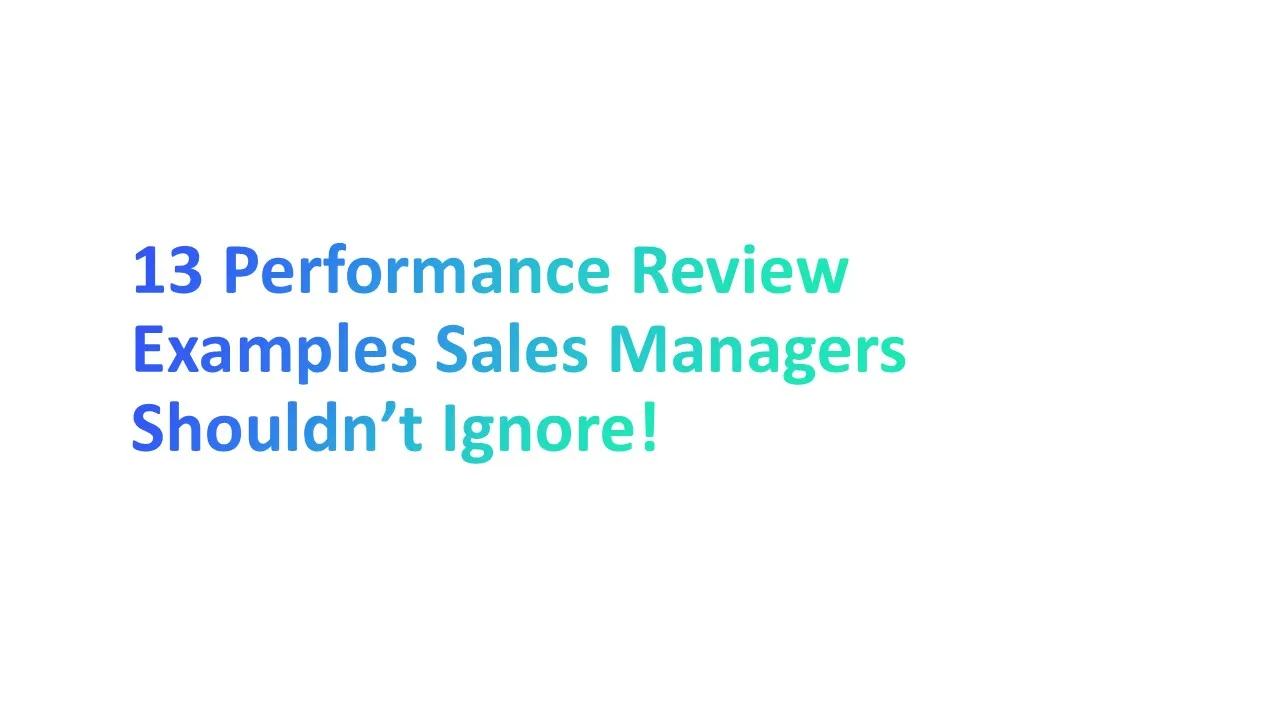Sales performance reviews are essential for driving growth and improving team productivity. Did you know that companies with strong performance review processes see a 14.9% lower turnover rate?
These reviews not only help identify strengths and areas for improvement but also align individual and professional development efforts with company goals. Let's explore 13 key examples sales reps shouldn't miss for success.
What is a Sales Performance Review?

A sales performance review is when managers look at how well a sales rep is doing. They see if the sales rep is meeting goals and how they can improve.
These reviews are important for both the company and the salesperson. It helps them know what they’re doing well and what needs work.
Why are Sales Performance Reviews important?
Sales performance reviews matter because they help everyone stay on track. It shows whether the sales team is working towards company goals.
According to studies, companies that do regular effective sales performance reviews have better sales results. Here are the key reasons why sales performance reviews are crucial:
1. Align Sales Efforts with Company Goals
- A good sales performance review checks if the salesperson is focusing on what matters most to the company.
- For example, if the company's goal is to increase revenue, sales reps need to focus on converting leads and hitting targets. Sales reviews ensure everyone is working on the same goals.
2. Identify Strengths and Areas for Improvement
- Sales reviews help find what a salesperson does well and where they need to improve.
- If a sales rep is great at closing deals but struggles with lead conversion, the manager can provide guidance. This makes the team stronger as a whole.
3. Enhance Accountability
- When salespeople know they’ll be reviewed, they take more responsibility for their work.
- This creates a culture of accountability, where each sales rep strives to hit their targets and improve their performance. Sales reviews make sure everyone is doing their part.
4. Optimize Sales Strategies
- During a performance review, managers can look at the sales techniques being used. If something isn’t working, they can change strategies.
- For example, if the current sales process isn’t leading to enough conversions, the team can adopt new techniques to enhance performance.
5. Increase Retention and Reduce Turnover
- Regular sales performance reviews can help keep salespeople happy.
- When they know they’re being listened to and have a chance to improve, they are more likely to stay with the company. This reduces the cost of hiring and training new sales reps.
6. Ensure Fair Compensation and Incentives
- Reviews also ensure that sales reps are fairly compensated. When salespeople meet or exceed their sales targets, they should be rewarded.
- This keeps them motivated to continue their success. It also ensures that the best salespeople are recognized for their hard work.
Sales Performance Review Examples

1. Achievement of Quota Goals
Sales quotas are targets set for individual sales reps. These goals can be based on how many products they sell or how much revenue they bring in.
Why It’s Important:
Meeting quota goals shows that your sales reps are contributing to the company's sales success well. If a salesperson regularly hits their quota, it indicates that they are performing well. However, missing quotas might mean they need extra support or training.
How to Implement:
- During the review, compare the sales rep’s performance against their set quota. If they met or exceeded their goals, acknowledge their effort.
- If they fell short, discuss why and explore ways to improve. Ask questions like, “What obstacles did you face?” This approach keeps the conversation open and constructive.
2. Lead Conversion Rate
Lead conversion rate is how well your sales reps turn potential leads into actual buyers. It shows the effectiveness of their sales techniques.
Why It’s Important:
A high conversion rate means that your sales team's performance is effective in moving leads through the sales funnel. Low conversion rates can signal a problem in their communication or follow-up techniques.
How to Implement:
- Start by reviewing how many leads the sales rep handled and how many converted into sales.
- If the conversion rate is high, encourage them to share what worked. If it’s low, identify areas where the process can improve.
For example, did they follow up consistently? Did they understand the customer's needs? Offer specific feedback to help them improve next time.
3. Pipeline Management Efficiency
Pipeline management refers to how sales reps track and move potential deals through various stages, from initial contact to closing the deal.
Why It’s Important:
Efficient pipeline management ensures no leads are forgotten, and the sales process flows smoothly. Reps who manage their pipeline well often close deals faster and more effectively.
How to Implement:
- During the review, check the rep’s pipeline.
- Are they keeping track of all their leads? Are they following up on time? If their pipeline is well-organized and efficient, praise them for it.
- If there are gaps, suggest using CRM tools or setting reminders to help manage leads better.
4. Collaboration with Marketing
Collaboration with marketing refers to how well the sales team works with the marketing department. Both sales leaders and teams should share information about leads, campaigns, and customer feedback.
Why It’s Important:
When sales and marketing work together, they can generate better leads and improve overall sales performance. Sales reps who collaborate with marketing are 67% more likely to close deals.
Marketing provides valuable insights into customer behavior, while sales offer real-world feedback from direct interactions with customers.
How to Implement:
- In the performance review, ask the sales rep about their involvement with marketing.
- Do they regularly share feedback with the marketing team? Have they collaborated on specific campaigns?
- You can also measure the impact of this collaboration by looking at lead conversion rates from marketing campaigns.
- Encourage sales reps to have regular meetings with marketing to align goals and strategies.
5. Customer Relationship Management (CRM) Usage
CRM usage refers to how well sales reps use tools like CRM software to track customer interactions and manage sales opportunities. CRM systems help keep information about leads, customers, and deals organized.
Why It’s Important:
Sales reps who use CRM systems effectively can manage their pipelines more efficiently and close more deals.
Studies show that companies using CRM software see a 29% increase in sales. CRM tools help reps stay on top of follow-ups, track customer behavior, and prioritize high-value leads.
How to Implement:
- During the review, assess how well the sales rep is using the CRM system.
- Are they logging interactions with customers? Are they using the CRM to set reminders and track deals?
- If the rep isn’t fully using the CRM, provide training or set expectations for its use. Encourage the rep to check their CRM daily and update it with each interaction.
6. Problem-Solving in Sales
Problem-solving in sales refers to how well sales reps handle challenges, such as customer objections, pricing issues, or product concerns.
Sales reps must think on their feet and find solutions that meet the customer's needs while closing the deal.
Why It’s Important:
Problem-solving is a critical skill in sales because it helps close deals that may otherwise be lost. Research shows that 60% of buyers walk away from deals due to unresolved objections. Sales reps who are good at solving problems can turn challenges into opportunities.
How to Implement:
- In the review, ask for specific examples of how the sales rep has handled difficult situations.
- Did they successfully resolve customer concerns? Did they find creative solutions to close a tough deal?
- Provide feedback on how well they handled these situations and offer tips for improving their problem-solving skills.
- Encourage role-playing exercises to help them practice handling objections in a safe environment.
7. Client Retention and Upselling
Client retention refers to how well a salesperson keeps existing customers. Upselling involves encouraging customers to buy additional products or services.
Why It’s Important:
Retaining clients is cheaper than acquiring new ones. Upselling helps increase revenue from your existing customer base.
Sales reps who focus on both retention and upselling are more likely to meet their sales goals and contribute to long-term business growth.
How to Implement:
- In the review, look at the sales rep's ability to retain clients and upsell products. Check metrics like the number of repeat customers and the value of upsell deals.
- If a salesperson struggles in this area, encourage them to build stronger relationships with clients by staying in touch and offering personalized recommendations.
- Provide training on effective upselling techniques, such as bundling products or offering discounts on upgrades.
8. Adaptability to New Sales Techniques
Adaptability means how easily a salesperson can learn and apply new sales techniques, tools, or strategies.
This might involve using new CRM tools, learning a different sales approach, or adjusting to changes in the market.
Why It’s Important:
The sales industry is constantly changing, and reps who adapt quickly are more likely to succeed. Salespeople who embrace new techniques tend to be more efficient and stay ahead of the competition.
How to Implement:
- During the performance review, ask the sales rep about recent changes in their sales techniques.
- Have they tried new methods or tools? Are they open to learning new strategies?
- If they are struggling to adapt, provide additional training or mentorship. Set goals for trying new approaches and track progress over time.
9. Time Management and Prioritization
Time management refers to how well a salesperson organizes their day and tasks. Prioritization is how they decide which tasks are most important and focus on those first.
Why It’s Important:
Sales reps who manage their time well are more productive. They close more deals and follow up with leads promptly.
Research shows that poor time management can lead to lost sales opportunities, with 20% of sales reps saying they waste hours each day on unproductive tasks.
How to Implement:
- In the review, ask the sales rep how they plan their day. Do they prioritize high-value tasks like following up with leads or closing deals? Are they using tools like calendars or task lists?
- If the rep struggles with time management, suggest they break their day into focused time blocks for specific tasks. Encourage them to use CRM tools to track their tasks and stay organized.
10. Sales Presentation Skills
Sales presentation skills refer to how well a salesperson communicates their product or service to a potential customer. It involves clear explanations, engaging visuals, and confidence in delivering the message.
Why It’s Important:
Good presentation skills can make or break a deal. A strong sales presentation keeps customers interested and helps them understand the value of what you’re offering. According to studies, salespeople who excel at presentations are 60% more likely to close deals.
How to Implement:
- During the review, assess the sales rep's ability to present effectively. Are they confident when speaking to customers? Do they use visuals or data to support their points?
- If a rep needs improvement, suggest they practice with a colleague or use presentation tools to create more engaging slides.
- \Role-playing exercises can also help improve their confidence and presentation delivery.
11. Proactive Prospecting
Proactive prospecting means actively seeking out new leads rather than waiting for them to come to you. It includes making cold calls, sending outreach emails, or connecting with potential customers on social media.
Why It’s Important:
Proactive sales reps generate more opportunities and are more likely to meet their sales targets. Research shows that 78% of salespeople who use proactive prospecting methods are more successful than those who don’t.
Waiting for leads to come to you can slow down the pipeline, but actively searching for them keeps sales moving.
How to Implement:
- Review how the sales rep approaches prospecting. Are they consistently reaching out to potential customers? Are they using multiple channels like emails, calls, and social media to connect with leads?
- If they’re not proactive, encourage them to set a daily goal for prospecting, such as making a specific number of calls or sending outreach messages.
- Provide guidance on how to improve their prospecting techniques, like crafting better email templates or learning new cold-calling scripts.
12. Cross-Selling and Bundling Success
Cross-selling is the practice of encouraging customers to buy additional products related to their original purchase. Bundling is when you offer multiple products together at a discounted price.
Why It’s Important:
Cross-selling and bundling are effective strategies to increase sales without acquiring new customers. In fact, 35% of Amazon’s revenue comes from cross-selling and product recommendations.
Sales reps who are good at this can increase their average deal size and increase overall sales performance.
How to Implement:
- Look at the sales rep’s success with cross-selling and bundling. Are they offering customers additional products during the sales process? Do they explain the benefits of bundled offers clearly?
- If a rep struggles in this area, train them to recognize opportunities to cross-sell or bundle products.
- Suggest they offer discounts on bundled products or highlight how additional items can solve the customer's needs.
13. Effective Negotiation Skills
Negotiation skills are the ability to find an agreement that benefits both the customer and the salesperson. It involves listening, asking the right questions, and finding solutions that work for everyone.
Why It’s Important:
Strong negotiation skills are essential because they help close deals and ensure customer satisfaction. A salesperson who can negotiate well can secure better terms and build trust with clients. In fact, 74% of successful sales reps say that mastering negotiation skills helps them close more deals.
How to Implement:
- During the performance review, ask the sales rep how they handle difficult negotiations. Do they listen to the client’s needs? Are they flexible while still protecting the company’s interests?
- Encourage them to practice active listening, explore win-win solutions, and use negotiation tactics like offering options or incentives. Training and role-playing can also improve these skills.
Tips to Conduct Sales Performance Reviews Efficiently

1. Set Clear Objectives and Metrics
Clear objectives and metrics are goals that you set to measure your sales reps' performance. These other sales objectives can include quotas, conversion rates, or other key performance indicators (KPIs).
Here’s how to do it:
- First, decide what you want your sales reps to achieve. Is it hitting a sales target, increasing lead conversions, or improving client relationships? Make these goals specific and measurable.
- For example, instead of just saying “increase sales,” set a target like “increase sales by 15% in the next quarter.”
- By having clear objectives, both you and your sales rep know what to aim for. It also makes it easier to track progress during the performance review process.
2. Prepare Thoroughly with Data
Having data on hand is crucial to giving an accurate overall performance in review. Data might include sales numbers, CRM usage, lead conversions, and client feedback.
Here’s how to do it:
- Before the review, gather all the important data about your sales rep's performance. Look at their sales efforts, sales targets, and how well they’ve used the sales process.
- Use sales performance metrics like total revenue generated, deals closed, or number of new leads. The more data you have, the better.
- It makes the conversation factual and helps avoid any bias. This way, you can focus on actual performance rather than relying on vague impressions.
3. Provide Regular Feedback, Not Just Annual Reviews
Regular feedback means offering advice or compliments to your sales reps consistently, not just once a year during the official sales performance evaluation and review.
Here’s how to do it:
- Don’t wait for the annual review to give feedback. Meet with your sales team regularly to check in on their progress.
- Weekly or monthly check-ins can help catch issues early and celebrate successes. During these meetings, focus on what’s working well and where there’s room for improvement.
- Providing positive feedback and constructive suggestions regularly builds trust and motivates your sales team to keep improving. You can also use these check-ins to adjust goals or provide additional support if needed.
4. Use a Structured Review Format
A structured performance review template and format means following a clear process during each performance review. This includes having set categories, such as communication skills, sales targets, and customer feedback.
Here’s how to do it:
- Create a template or checklist that you can use for every sales performance review. This will ensure consistency and fairness across all reviews.
- Start by listing key areas like sales efforts, sales targets, and team performance.
- Using this structured format helps keep the conversation focused and allows both you and the sales rep to address specific topics. Plus, it makes it easier to compare performance over time.
5. Encourage Self-Assessment
Self-assessment means giving the sales manager or rep a chance to evaluate their own performance before the official review.
Here’s how to do it:
- Before the performance review, ask your sales reps to fill out a self-assessment form.
- Have them reflect on their sales goals, areas where they excel, and areas they want to improve. This not only gets them thinking critically about their performance, but also opens the door for an honest conversation.
- When reps share their thoughts, it often leads to better positive feedback and more effective goal-setting during the review process.
6. Focus on Development, Not Just Evaluation
Instead of just evaluating past performance, use the sales performance review template as a chance to discuss how the sales rep can grow and improve.
Here’s how to do it:
- During the review, spend time talking about future development.
- What skills does the sales rep need to improve? How can they be better at customer interactions, or how can they sharpen their sales techniques?
- Set clear goals for development, and provide resources such as training or mentorship opportunities.
- When the review focuses on growth rather than just criticism, it motivates the sales rep to take actionable steps toward improving their performance.
7. Be Specific and Actionable
Being specific means giving clear examples and feedback, while being actionable means suggesting steps for improvement.
Here’s how to do it:
- Instead of saying, “You need to improve your sales,” be specific about what needs improvement.
- For example, mention, “Your lead conversion rate is lower than the team average. Let’s focus on improving that by targeting high-quality leads.”
- Then, suggest specific actions they can take, such as following up with leads more quickly or attending a workshop on conversion tactics. This makes the feedback clear and gives the sales rep something concrete to work on.
8. Balance Positive Feedback with Constructive Criticism
Balancing feedback means giving both praise and areas to improve. It helps keep the review fair and motivates your individual and team objectives.
Here’s how to do it:
- When conducting sales performance reviews, start with something positive. For example, “You’ve done a great job meeting your sales targets.”
- Then, add constructive criticism like, “However, we need to work on customer relationship building.” By offering positive feedback first, your sales rep feels appreciated.
- Constructive feedback, when delivered in a friendly tone, feels like an opportunity to grow rather than just criticism. This balance helps maintain team morale while encouraging development.
9. Set SMART Goals for the Next Period
SMART goals are Specific, Measurable, Achievable, Relevant, and Time-bound. They help guide the sales rep to success in the next review period.
Here’s how to do it:
- During the review, set SMART goals with your sales rep. For example, instead of saying, “Sell more,” set a goal like, “Increase sales by 10% over the next three months by improving lead follow-ups.”
- This goal is specific (increase sales), measurable (10%), achievable (realistic based on past performance), relevant (it aligns with the company’s goals), and time-bound (three months).
- Setting SMART goals makes it clear what’s expected and gives the sales rep something tangible to aim for.
10. Document the Review and Follow Up
After each sales performance evaluation and review, it’s important to document what was discussed. This means writing down the key points, feedback, and goals. Following up ensures that progress is being made.
Here’s how to do it:
- During the review, take notes on both positive feedback and areas for improvement.
- Write down specific action points, like “Improve lead conversion rate by 10% within three months.”
- After the meeting, send the sales rep a summary of the review. This keeps everything clear and makes sure there’s no confusion about what was discussed.
Conclusion
In sales, comprehensive sales performance review is key to improving your team’s future success. By following clear steps, like setting goals and providing regular feedback, you can help your sales reps grow. Remember, reviewing isn’t just about the numbers—it’s about helping your team become better each day.





.jpg)

.jpg)
